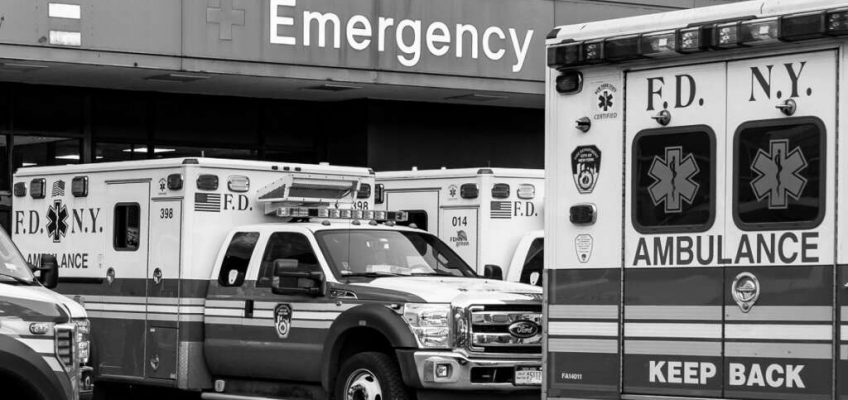“Sweeps, crackdowns, and mass hospitalizations may make homelessness less visible for a moment, but they don’t solve it. They just push suffering out of view—until it resurfaces again, often worse.”
Ambulances outside Lincoln Medical Center in the Bronx. (Adi Talwar/City Limits)
I met a man I’ll call “Darrell” near Chelsea Park in Manhattan. He was sitting quietly on a bench, dressed neatly but clearly weathered by life on the street. I offered him a cup of lemonade, and soon he was telling me his story—how he went from stability to homelessness.
Darrell was diagnosed with schizophrenia in his teens. He struggled through college but found a treatment plan that worked. He held a steady job with health insurance that kept him medicated and stable—until 2020, when the pandemic cost him his job, his insurance, and eventually, his grip on reality. Without meds, the voices came back. He stopped looking for work and knew he needed government-subsidized healthcare before things spiraled further. But once he finally received benefits, the earliest psychiatric appointment he could get was eight weeks out.
Darrell’s story isn’t unique. In my 15 years working with people experiencing homelessness in New York and New Jersey, I’ve met hundreds like him. Contrary to popular belief, most aren’t refusing help—they’re caught in systems that are underfunded, understaffed, and overwhelmed. We often call people “service resistant,” but in reality, it’s the services themselves that resist people.
That’s why the recent show of force in Washington, D.C., in response to President Donald Trump’s order that “the homeless have to move out IMMEDIATELY,” is so troubling. Not to be outdone, Mayor Eric Adams has floated his own plan to involuntarily hospitalize people with untreated mental illness or drug use in New York City.
Both Trump and Adams are trying to frame coercion as compassion. But removing people from sight—whether to a hospital ward, a jail cell, or a distant encampment—without addressing the root causes only deepens the crisis and ignores research showing that forced treatment rarely works.
In practice, forced hospitalization often means hours—sometimes days—waiting in an ER hallway because no psychiatric beds are available. New York alone has lost nearly 1,000 psychiatric beds in recent years. Even when a bed is found, discharge usually comes before real stabilization, with no follow-up plan and nowhere to go. The result? More trauma, more mistrust, and more costly cycles of hospitalization, incarceration, and street homelessness.
Even if such measures provide temporary stability, the bigger question is: what next? Most cities don’t have nearly enough supportive housing—affordable apartments with built-in services to help people stay well. Waitlists stretch for months, even years. Without housing, people return to the street, and the cycle repeats.
We’ve seen this movie before. Sweeps, crackdowns, and mass hospitalizations may make homelessness less visible for a moment, but they don’t solve it. They just push suffering out of view—until it resurfaces again, often worse.
There is a better way, and we already know what it looks like. People need timely access to care, not police escorts. They need mobile mental health teams that meet them where they are. They need respite care after hospitalizations, and case managers who stick with them beyond a single crisis. And most of all, they need housing—because treatment without stability rarely lasts.
The impulse behind these high-profile crackdowns may be to respond to suffering. But homelessness and mental illness aren’t solved through control. They’re addressed through care, compassion, and infrastructure. The opposite of homelessness isn’t hospitalization—it’s housing. It’s healthcare. It’s dignity.
And it’s a system that helps people before they fall—so they don’t end up on a park bench, waiting for care that may never come. Or worse: locked in an ambulance, only to be discharged back to the same street, three days later, more broken than before.
Josiah Haken is the CEO of City Relief, a non-profit dedicated to connecting the unhoused community to hope and resources.
The post Opinion: Forced Hospitalization Isn’t the Answer—Housing, Healthcare, and Compassion Are appeared first on City Limits.


Leave a Reply